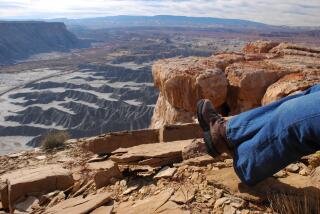Protesting Utah oil and gas leases
- Share via
What’s a legitimate form of protest? Is it OK to throw a shoe at the president whose army invaded your country? To firebomb the house of a UCLA scientist whose work includes experimenting on animals? To create a blacklist of Proposition 8 supporters? To help plant a bomb in the Pentagon because you believe that a war is unjust?
Protest can take many forms -- violent or peaceful, legal or illegal. Sometimes it is clearly beyond the pale. (Yes, that’s you, Bill Ayers.) Sometimes it’s illegal but morally defensible. (No reasonable person today thinks Rosa Parks should have given up her seat on the bus to a white man.) Sometimes people just can’t agree on whether it’s right or wrong. (As in the case of protests at abortion clinics or efforts to get Proposition 8 backers fired from their jobs.)
Into this moral morass steps Tim DeChristopher, a 27-year-old economics student at the University of Utah who objected so strenuously to last week’s auction of oil and gas drilling leases in southern and eastern Utah that he decided to attend. He then proceeded to bid up prices by hundreds of thousands of dollars for some parcels and acquired about $1.8 million worth himself -- before it became clear that he had neither the means nor the slightest intention of paying for the leases. He threw the process into chaos, and bidding was briefly halted. Prosecutors are weighing possible fraud charges against him.
Was DeChristopher justified? The leases offered at the controversial auction permitted drilling on more than 110,000 pristine acres of public lands in Utah, including some of America’s most beautiful and environmentally sensitive red-rock desert. Although the Bureau of Land Management had, under pressure, withdrawn some parcels from its original list, the auction nevertheless represented an eleventh-hour assault on the environment by the Bush administration, eager as always to satisfy the oil and gas industry while continuing to feed our dangerous addiction to fossil fuels.
DeChristopher, who says he acted only after years of marching, writing letters and signing petitions, didn’t take any enormous risks with the lives or property of others. He didn’t spike a tree, as some environmental activists have done, posing a danger to loggers. He didn’t commit arson or vandalism. More theater than guerrilla warfare, his stunt -- like that of Muntather Zaidi, who threw his shoes at President Bush last week -- got its point across reasonably safely.
Yet DeChristopher may have accomplished something significant. The auction, or parts of it, may have to be rescheduled, possibly by a less eager-to-lease Obama administration.
If prosecutors decide his actions were illegal, DeChristopher must face the consequences, and maybe even go to jail. That’s the price of civil disobedience. You break the law, you take the rap.
Still, we can think of worse ways to make a point.
More to Read
A cure for the common opinion
Get thought-provoking perspectives with our weekly newsletter.
You may occasionally receive promotional content from the Los Angeles Times.






